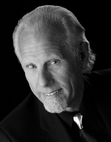RIDING THE RANGE WITH BEN BOULDEN
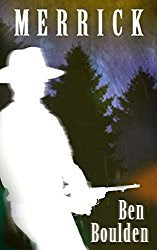
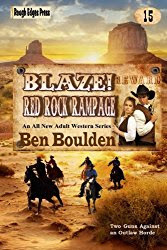 RIDING THE RANGE WITH BEN BOULDEN
RIDING THE RANGE WITH BEN BOULDENBen Boulden is one of the newest wordslingers on the Western scene having written two entries in the current Adult Western series Blaze! and introducing an original Western tough guy in his latest work, Merrick. Ben, however, is no neophyte writer having written over 300 reviews for various literary outlets, conducted numerous interviews for publication, and produces a constant stream of genre related posts on his blog, Gravetapping.
I recently shook out my lasso, tossed it around Ben’s shoulders, and hauled him into the sheriff’s office for a few questions...
********If the Texas Rangers pinned a wanted poster for Ben Boulden on the sheriff’s office wall, what pertinent information would it contain?
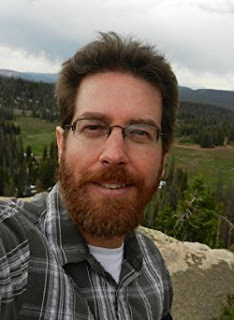 I’ve been told everyone loves to talk about themselves, and I’m no different, but whenever I’m confronted with a request for self-talk, I get a wild look in my eyes, stutter, and basically get scared. So, here are the facts, broad and bare—I live and work in the Salt Lake Valley, in the foothills of Utah’s Wasatch Mountains. I’m a trained accountant and have spent my career as an auditor. I’m married to the finest woman anywhere. We have a beautiful and intelligent daughter. A dog, a one-eyed cat, and a fish. I spend as much time in the mountains and deserts surrounding Salt Lake City as I can and still pay the mortgage.
I’ve been told everyone loves to talk about themselves, and I’m no different, but whenever I’m confronted with a request for self-talk, I get a wild look in my eyes, stutter, and basically get scared. So, here are the facts, broad and bare—I live and work in the Salt Lake Valley, in the foothills of Utah’s Wasatch Mountains. I’m a trained accountant and have spent my career as an auditor. I’m married to the finest woman anywhere. We have a beautiful and intelligent daughter. A dog, a one-eyed cat, and a fish. I spend as much time in the mountains and deserts surrounding Salt Lake City as I can and still pay the mortgage. I write the Short and Sweet: Short Stories Considered column, book reviews and author interviews for Mystery Scene Magazine. Down & Out: The Magazine published my noir crime story, A Calculated Risk, in its most recent issue, but I seem to get more rejections than acceptances.
What was your introduction to Westerns—movies, TV, or books?
My father watched John Wayne films on television during my adolescence, and I have fond memories of movies like Chisum, True Grit, Rooster Cogburn, The Shootist and the most powerful to my pre-teen soul, The Cowboys. And while these films were technically my introduction to the western genre, I didn’t see the artistry of the genre—films and books both—until watching the films with adult eyes and understanding their grand themes. The mad desire to settle the great western deserts, the outsiders place in society, community and religion, greed, love and hate, and the power of faith and hope. The Searchers is a film—based on a novel by Alan Le May—that captures the western story at its best with a deeply flawed protagonist, violence, and an unceasing desire to achieve a seemingly impossible task.
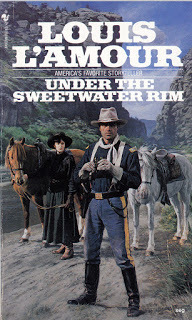 What was the first Western you read?
What was the first Western you read?This question is harder to answer than it should be. The first western writer I read was Louis L’Amour and there is some argument—in my head at least—as to the first novel of his I read. It was either Under the Sweetwater Rim, or Taggart. I do know whichever title I read first, both came from a large box of books in my grandfather’s basement. A box I would very much like to see again.
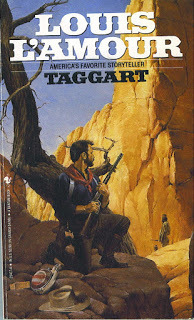 What was it about the genre you found compelling enough for you to want to write a Western?
What was it about the genre you found compelling enough for you to want to write a Western?The landscape of the west has always intrigued me and the seeming madness of the men and women who uprooted their families to make a new future in such a rugged, lonely, and unforgiving place.
How did your long-running Gravetapping blog come into existence, and what is the entomology behind the name?
I started Gravetapping on a whim back in 2006. I wanted to improve my writing and a public forum, even if I was the only reader, would force me to develop as a writer for the simple reason that anyone, anywhere, would be able to see my writing and the idea of producing a poor product—that people could actually read—made me work harder. It made me learn how to write and re-write and re-write again, which is a process I’m still learning and (hopefully) improving every day.
The name is purely made up. When I started Gravetapping, I was in the midst of an extended love affair with horror and the blog was intended to primarily be a place for horror fiction and I thought the name sounded a little Poe-like. My reading tastes strayed away from horror not long after I started the blog, and when I jumped to a new blog with what I thought would have broader name appeal—Dark City Underground—my three readers refused to follow and so I came back to Gravetapping.
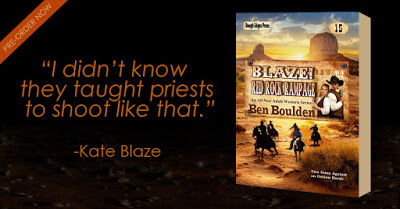 You wrote your debut novel for the Blaze! Western series. How did you get the opportunity and how did you find the experience of writing to novel length?
You wrote your debut novel for the Blaze! Western series. How did you get the opportunity and how did you find the experience of writing to novel length?Everything comes back to Gravetapping, including the opportunity to write my first novel, Blaze! Red Rock Rampage. I had been in contact with Stephen Mertz, the creator of Blaze!, for many years, reviewed several of his novels—which are all absolutely terrific and books everyone should read—and interviewed him at the blog back in the Spring of 2016.
When the interview was completed, Steve asked if I would like to try my hand at writing a Blaze! book. I hesitated for about three minutes, said yes, wrote the first two chapters of RRR, and both Steve and James Reasoner, editor and publisher at Rough Edges Press, told me to keep going. I did, and amazingly it was published. It still feels unreal, and to be honest damn lucky. I love looking at the book sitting on my bookshelf, and even better holding it in my hands.
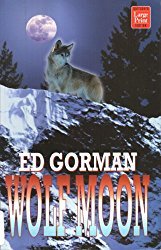 I know you read in many different genres, but do you have one or two favorite Western writers?
I know you read in many different genres, but do you have one or two favorite Western writers?Ed Gorman is my favorite western writer. He wrote western noir, with heavy crime influences, that delve into the human experience while never allowing the story to become stale or boring. His characters are flawed, complicated, and act like people we know and interact with daily. My favorites of Ed’s westerns are: Death Ground, Wolf Moon, Backshot: 1902, Trouble Man, Night of Shadows—I could go on and on.
Ed was a marvelous writer and his work should garner a larger audience than it has. In my thinking, there are a few of his novels people will be reading decades from now for two reasons. The first is the accuracy of his portrait of human suffering and human morality in the late 1900s and early 2000s. The second reason is to admire the near perfect craft Ed used writing his fiction.
I also enjoy the westerns Elmore Leonard wrote at the beginning of his career with their lean dialogue, clean style, and hard plots. For all of Leonard’s success as a crime writer, I think his westerns are his best work. H. A. DeRosso wrote some of most brutal western short stories I’ve read, and his use of landscape—particularly in his Shadowlands tales—is as good as anything out there. Brian Garfield is another favorite, as is Harry Whittington, Louis L’Amour, and Donald Hamilton. I’m probably missing several others, but…
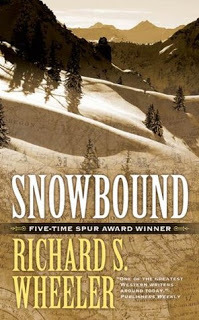 Do you read any current Western wordslingers?
Do you read any current Western wordslingers?My reading of current Western writers is more limited than it should be. I review mystery, crime and suspense novels and short stories for Mystery Scene Magazine and that commitment takes a significant amount of my reading time. But, I very much enjoy reading Richard S. Wheeler’s work, especially his biographical novels—An Obituary for Major Reno and Snowbound are two favorites—along with his mining town novels. Although, due to age and health issues, it’s my understanding Mr. Wheeler is no longer writing.
I also enjoy, and have recently read, Johnny D. Boggs, Brent Towns (who writes under a few pseudonyms), James Reasoner (the most prolific and highest quality writer whose name most readers are unfamiliar with, but have probably read), Loren D. Estleman, and Max McCoy.
How do you perceive the current status of the Western genre?
This question, for me, has two distinct elements. The first is the quality and vitality of the work being produced in the genre, which I think is very high. There are a number of writers—see the names I’ve listed above, along with a bunch of other writers like Joseph A. West and Dusty Richards—that are producing work at high levels. The Westerns being written today are as good or better than they have ever been.
The second element is the genre’s commercial vitality, which is a poor reflection of the superb stories being written. Ebooks have provided a bump and a new market for the genre and its writers, which is a great thing, but from my view it hasn’t been enough to keep the genre healthy long-term. Publishers need to figure out how to market Western novels to a larger audience than is currently purchasing and reading the stories or the best writers will move into other genres—crime, thriller, etc.—where there is a higher potential for financial gain.
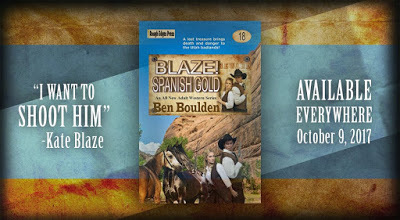 Do you have a writing mentor?
Do you have a writing mentor?I’ve been lucky. I’ve had two mentors—Ed Gorman and Stephen Mertz. Ed introduced me to the idea I could write. He helped me break into the pages of Mystery Scene Magazine as a critic and allowed me to write an Introduction for an omnibus of his private eye novels, The Autumn Dead and The Night Remembers, published by Stark House. Ed passed away in October 2016, and for a guy I never met in person, I miss his presence in my life more than I can say. And my mentioning him here would keep Ed embarrassed for weeks.
And Steve Mertz has been a guide for me as I’ve tried to figure out what I want to write, how I want to write, and how I should write. His generosity and patience, and cool optimism, are remarkable and very much appreciated. Not to mention, he used his influence to help me get those two Blaze! contracts.
When you start writing a new Western, do you pick a standard Western plot (I think there are about six) and look for a way to turn it on its head, or do you look to history or some other source for inspiration?
I start with the characters and the story’s place. The place for me, in this context, is more about landscape and its impact on the characters than it is about the broader implication of setting. The rising red rock country of Southern Utah. The high, rugged and unforgiving mountain landscapes. These locations or landscapes impact the characters in how they survive and see the world, as well as the type of story or plot that would fit that landscape and (ultimately) setting.
I tend to see the characters, at first, in snippets. A man walking down a boardwalk, his steps echoing across a deserted street. Then I ask a few questions. Who is he? Where is he? What is he doing? The answers develop both the character and place, which I then use to build the story or plot frame by frame.
An example of this is my story, Merrick. The genesis was an image of a man riding a paint hard across a gray stained alkaline desert. Smoky pale dust in a line behind him. Once I determined where he was—Utah’s West desert—and who he was—an outlaw—the story developed for me.
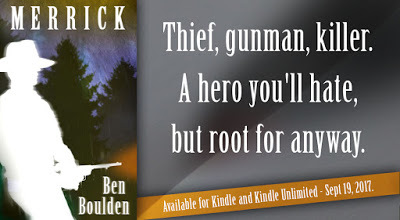 In your latest Western, you’ve introduced a new character, Merrick, into the Wild West. What was the genesis of the character and where do you see him riding the range in the future?
In your latest Western, you’ve introduced a new character, Merrick, into the Wild West. What was the genesis of the character and where do you see him riding the range in the future?Merrick is the sort of guy who gets things done. While he is an outlaw, he has high personal ethics and a sense of right and wrong—you take only what is yours, you never betray your partners, and you kill only when necessary. He lives and works in the closed environment of 1890s Utah, when the Mormon Church held almost absolute power over the region, and there exists (purely fictional on my part) an organized crime syndicate called The Elders. The syndicate controls the crime across most of the territory. Merrick is an outsider, non-Mormon, and an independent operator who roams the desert southwest looking for his next job.
I have big plans for Merrick as a character. I’m working on a novel now, which is mostly plotted and a handful of scenes written, with its action a direct result of what happens in the currently available story, Merrick. We’ll see what happens, but I hope something good comes from Merrick’s criminal ways.
********Thx to Ben for stepping down from the saddle and sitting around the campfire with me. I’m definitely looking forward to the next six-gun adventure from his blazing typewriter...
TO VISIT BEN’S BLOG CLICK HERE
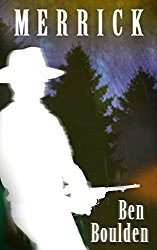 MERRICK Merrick is hard, tough, and when he needs to be, mean as hell. When Merrick is called in as a late-replacement for a payroll heist his first inclination is greed. His second is hesitation, since anyone who says a job will be easy is a liar, but this job has been planned by an old partner, Clarence Tilley, who has masterminded more than a few successful heists...It’s a four man job with a payout worth $15,000, and Merrick’s share would keep him in whiskey and satin for a year. But it may also get him killed...
MERRICK Merrick is hard, tough, and when he needs to be, mean as hell. When Merrick is called in as a late-replacement for a payroll heist his first inclination is greed. His second is hesitation, since anyone who says a job will be easy is a liar, but this job has been planned by an old partner, Clarence Tilley, who has masterminded more than a few successful heists...It’s a four man job with a payout worth $15,000, and Merrick’s share would keep him in whiskey and satin for a year. But it may also get him killed...
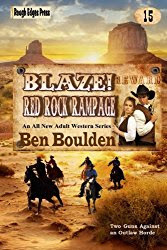 BLAZE! #15: RED ROCK RAMPAGE J.D. and Kate Blaze ride into the settlement of Small Basin, Utah, on the trail of train robbers but soon discover that the town and the surrounding area are ruled by the iron fist of a renegade Mormon patriarch—and he has his eye on two beautiful young women he intends to make unwilling brides. Hired killers, corrupt lawmen, and brutal kidnappers mean a heap of trouble for the Old West's only husband-and-wife gunfighters. Forced to split up, Kate and J.D. have to battle their way back to each other to survive…Red Rock Rampage is another fast-action gem in the Blaze! series, full of intriguing characters, gritty violence, and vividly realized settings...
BLAZE! #15: RED ROCK RAMPAGE J.D. and Kate Blaze ride into the settlement of Small Basin, Utah, on the trail of train robbers but soon discover that the town and the surrounding area are ruled by the iron fist of a renegade Mormon patriarch—and he has his eye on two beautiful young women he intends to make unwilling brides. Hired killers, corrupt lawmen, and brutal kidnappers mean a heap of trouble for the Old West's only husband-and-wife gunfighters. Forced to split up, Kate and J.D. have to battle their way back to each other to survive…Red Rock Rampage is another fast-action gem in the Blaze! series, full of intriguing characters, gritty violence, and vividly realized settings...
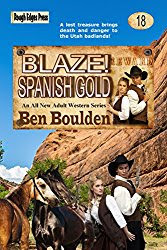 BLAZE! #18: SPANISH GOLD The only thing Kate and J.D. Blaze had in mind when they rode into the settlement of Unity, Utah, was celebrating their wedding anniversary. But then J.D. is forced to kill a corrupt deputy in order to save a woman’s life, and suddenly the Old West’s only husband-and-wife gunfighters are plunged into a deadly mystery involving a sinister albino, missing men, and a lost treasure in Spanish gold…It’s action all the way as critically acclaimed author Ben Boulden returns with another exciting installment in today’s top Western series...
BLAZE! #18: SPANISH GOLD The only thing Kate and J.D. Blaze had in mind when they rode into the settlement of Unity, Utah, was celebrating their wedding anniversary. But then J.D. is forced to kill a corrupt deputy in order to save a woman’s life, and suddenly the Old West’s only husband-and-wife gunfighters are plunged into a deadly mystery involving a sinister albino, missing men, and a lost treasure in Spanish gold…It’s action all the way as critically acclaimed author Ben Boulden returns with another exciting installment in today’s top Western series...
Published on January 07, 2018 22:33
No comments have been added yet.

